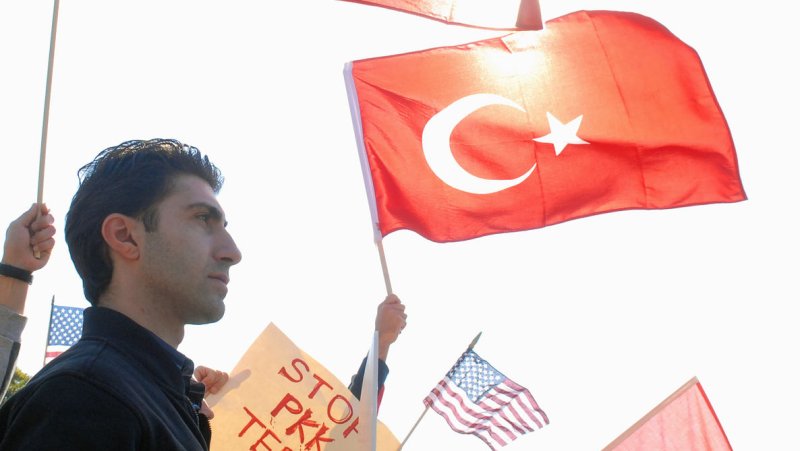Turkish demonstrators protest the Kurdish PKK, a militant group based in Northern Iraq on the Turkish border. (UPI File Photo/Roger L. Wollenberg) |
License Photo
BEIRUT, Lebanon, July 2 (UPI) -- Amid the growing tensions between Syria and Turkey over the uprising against the Damascus regime, Turkish officials say Syria is aiding Kurdish secessionists in their 28-year-old war against Ankara.
That could trigger a confrontation that would dangerously widen the Syrian conflict.
As relations between Damascus and Ankara deteriorate after Syrian air defenses shot down a Turkish RF-4E reconnaissance jet June 22, there are also reports that Turkey's National Intelligence Organization, the Milli Istihbarat Teskilati, or MIT, has been stirring unrest inside Syria to aid insurgent forces seeking Assad's downfall.
The MIT's reported activities would appear to be in response to clandestine operations by Syria's intelligence services, long a pillar of the embattled regime headed by President Bashar Assad, inside Turkey, a key supporter of the Syrian Free Army battling Assad's forces.
The Turkish rebels of the Kurdistan Workers' Party, or PKK, have been fighting Turkey's central government since 1984 for an autonomous state in southeastern Anatolia.
Some 44,000 people have been killed in that conflict, which has escalated in recent months, possibly because of Syrian support for the PKK in an effort to destabilize Turkey.
Ankara insists it does not want to get dragged into what is rapidly evolving as a civil war in Syria, and its restraint since the June 22 shootdown would seem to underline that.
But Ankara's Sunni leadership has roundly condemned the bloodbath in Syria, in which majority Sunnis have been killed in their thousands by the Alawite-minority regime.
Turkey's said it won't intervene militarily in Syrian except under an international umbrella.
That's an unlikely prospect right now. But the Kurdish factor, a strategic issue for Ankara, could prod Turkey into action, and thus internationalize the Syrian conflict with potentially perilous consequences.
There have been persistent reports that Ankara's helping arm Assad's opponents. It has allowed the FSA's emerging command structure to be based in a border refugee camp that's protected by Turkish intelligence.
According to Soner Cagaptay, director of the Turkish Research Program at the Washington Institute for Near East Policy, Assad welcomed the PKK back into Syria several months ago.
Cagaptay claims up to 2,000 PKK fighters were allowed to move into Syria from eastern Iraq where they'd been repeatedly hit by Turkish airstrikes.
In April, a report by the U.N. human rights agency alleged that the PKK had been helping crush resistance to Assad by assassinating Syrian Kurdish leaders who wanted to join the fight against the Damascus regime.
Three Turkish officers were killed in an attack near the Syrian border in May, reportedly by PKK forces based in Syria.
The same month, Turkish authorities said two PKK militants infiltrated Turkey from Syria with nearly 90 pounds of plastic explosives.
The pair detonated the explosives when they were stopped at a checkpoint in southeast Turkey, killing themselves and a police officer.
Turkish Recep Tayyip Erdogan said the militants were probably on their way to stage a major attack in a Turkish city.
Ankara's alarm was sharply heightened in March when Syria's 2 million-strong Kurdish minority declared independence in their region in northeastern Syria.
The Turks deemed they must have cut a deal with Assad in return for not joining the uprising. The Sunni-dominated Syrian opposition has reportedly refused to give Syrian Kurds such clear-cut guarantees.
The last thing Ankara wants is an independent Kurdish zone in Syria, linked to the semi-autonomous, oil-rich Kurdish enclave in northern Iraq.
This, the Turks argue, would only encourage the PKK to fight on and join what could become a Kurdish state spanning Turkey, Iraq and Syria.
That would dramatically change the geopolitical landscape in a region reeling from the political turmoil of the Arab Spring and the growing confrontation between Shiite Iran and the Sunni kingdoms of the Persian Gulf, the consequence of a 1,300-year-old religious feud within Islam.
The PKK, outlawed by Ankara, has been designated a terrorist organization by the United States and the European Union.
Throughout the 1980s and 90s, Damascus was at odds with Turkey and supported the PKK. The two states were on the brink of war in 1998 until Syria expelled PKK leader Abdullah Ocalan.
With the rise to power of Turkey's Islamists under Erdogan in 2002, relations improved greatly. But they plunged again when the Syrian insurrection broke out March 15, 2011.





